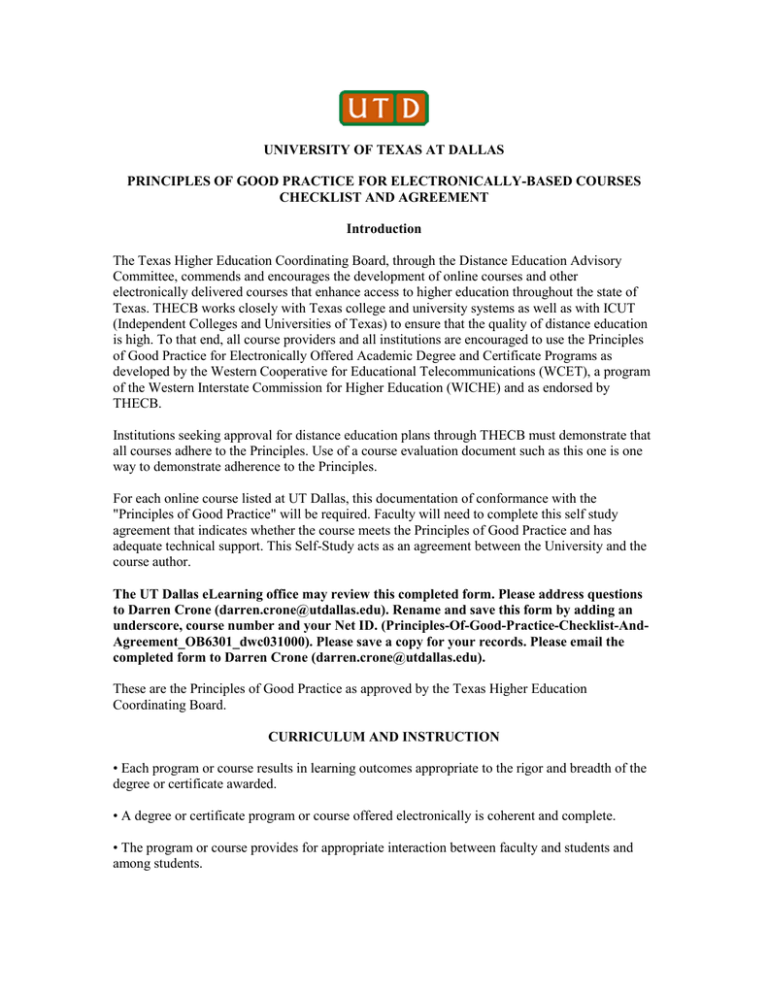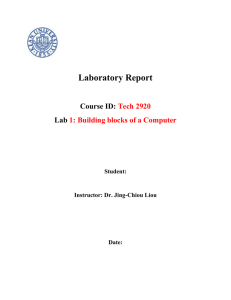UNIVERSITY OF TEXAS AT DALLAS CHECKLIST AND AGREEMENT
advertisement

UNIVERSITY OF TEXAS AT DALLAS PRINCIPLES OF GOOD PRACTICE FOR ELECTRONICALLY-BASED COURSES CHECKLIST AND AGREEMENT Introduction The Texas Higher Education Coordinating Board, through the Distance Education Advisory Committee, commends and encourages the development of online courses and other electronically delivered courses that enhance access to higher education throughout the state of Texas. THECB works closely with Texas college and university systems as well as with ICUT (Independent Colleges and Universities of Texas) to ensure that the quality of distance education is high. To that end, all course providers and all institutions are encouraged to use the Principles of Good Practice for Electronically Offered Academic Degree and Certificate Programs as developed by the Western Cooperative for Educational Telecommunications (WCET), a program of the Western Interstate Commission for Higher Education (WICHE) and as endorsed by THECB. Institutions seeking approval for distance education plans through THECB must demonstrate that all courses adhere to the Principles. Use of a course evaluation document such as this one is one way to demonstrate adherence to the Principles. For each online course listed at UT Dallas, this documentation of conformance with the "Principles of Good Practice" will be required. Faculty will need to complete this self study agreement that indicates whether the course meets the Principles of Good Practice and has adequate technical support. This Self-Study acts as an agreement between the University and the course author. The UT Dallas eLearning office may review this completed form. Please address questions to Darren Crone (darren.crone@utdallas.edu). Rename and save this form by adding an underscore, course number and your Net ID. (Principles-Of-Good-Practice-Checklist-AndAgreement_OB6301_dwc031000). Please save a copy for your records. Please email the completed form to Darren Crone (darren.crone@utdallas.edu). These are the Principles of Good Practice as approved by the Texas Higher Education Coordinating Board. CURRICULUM AND INSTRUCTION • Each program or course results in learning outcomes appropriate to the rigor and breadth of the degree or certificate awarded. • A degree or certificate program or course offered electronically is coherent and complete. • The program or course provides for appropriate interaction between faculty and students and among students. • Qualified faculty provides appropriate oversight of the program or course that is offered electronically. • Programs or courses offered electronically are offered on the campus of the institution where the programs or courses originate. • Academic standards for all programs or courses offered electronically will be the same as those for programs or courses delivered by other means at the institution where the program or course originates. • Student learning in programs or courses delivered electronically should be comparable to student learning in programs offered at the campus where the programs or courses originate. INSTITUTIONAL CONTEXT AND COMMITMENT Role and Mission • The program or course is consistent with the institution's role and mission. • Review and approval processes ensure the appropriateness of the technology being used to meet the objectives of the program or course. Students and Student Services • Program or course announcements and electronic catalog entries provide appropriate information. • The program or course provides students with clear, complete, and timely information on the curriculum, course and degree requirements, nature of faculty/student interaction, assumptions about technological competence and skills, technical equipment requirements, availability of academic support services and financial aid resources, and costs and payment policies. • Enrolled students have reasonable and adequate access to the range of student services and student rights appropriate to support their learning. • The institution has admission/acceptance criteria in place to assess the extent to which a student has the background, knowledge and technical skills required to undertake the program or course. • Advertising, recruiting, and admissions materials clearly and accurately represent the program or course and the services available. Faculty Support • The program or course provides faculty support services specifically related to teaching via an electronic system. • The institution assures appropriate training for faculty who teach via the use of technology. • The institution provides adequate equipment, software, and communications access to faculty to support interaction with students, institutions, and other faculty. Resources for Learning • The institution ensures that appropriate learning resources are available to students. • The institution evaluates the adequacy of, and the cost to students for, access to learning resources and documents the use of electronic resources. Commitment to Support • Policies for faculty evaluation include appropriate recognition of teaching and scholarly activities related to programs or courses offered electronically. • The institution demonstrates a commitment to ongoing support, both financial and technical, and to continuation of the program or course for a period of time reasonable and sufficient for students to complete the course or program. EVALUATION AND ASSESSMENT • The institution evaluates the program's or course's educational effectiveness, including assessments of student learning outcomes, student retention, and student and faculty satisfaction. • At the completion of the program or course, the institution provides for assessment and documentation of student achievement in each course. Principles of Good Practice Checklist and Agreement (This document is adapted from one developed by the THECB) Course Information Please provide the following information: UTD Program: Course number and section: Course title (in campus inventory): Name, title, phone, and e-mail of principal contact person: Name, title, and component of each instructor: Course Description: Course Level: Pre-Collegiate Undergraduate Graduate Other Credit Type: Academic Correspondence Extension K-12 Faculty/Staff Development Continuing Education Non-credit Professional Development Credit Hours: Prerequisite(s) and/or required academic skills/background of students: Number of students recommended: Previous Offerings by applying faculty: Face-to-face, Number of semesters: Online, Courseware: , Number of semesters: Web-enhanced, Courseware: , Number of semesters: ITV, Number of semesters: Other: , Number of semesters: Technical Notes Note: As you complete this section of the self-study, please consult with the appropriate staff at your department/institution. Course Management Platform: BLACKBOARD WEBCT Students will use a variety of browsers and hardware. Have you tested your course on a combination of browser versions and hardware platforms? (For example, Netscape on an older PC, or Explorer on a Mac). Did the course pass all of these requirements? Yes (by whom?) No (by whom? please list what technical requirements were not met and why) Americans with Disabilities Act Does the course comply with the Americans with Disabilities Act and, specifically, the Rehabilitation Act Amendments in Section 508? For more information, see the ADA Guidelines and Section 508 of the Rehabilitation Act regarding electronic and information technology accessibility standards. Yes No (please list what accessibility requirements were not met and why) Course Copyright and Permissions It is the responsibility of the instructor and his/her colleagues to ensure that all copyright provisions are met and those permissions have been obtained as appropriate. Instructors can locate information on copyright law relating to the use of academic materials at: http://www.utdallas.edu/elearning/instructors/copyright.html. Have you confirmed that the inclusion of all course materials in the course not developed by the copyright holder meet "fair use" guidelines, or that you are otherwise exempt from liability from infringement, or you have received appropriate permissions from all copyright holders? In any case where the institution and/or course author(s) contribute copyrightable expression, the institution and/or course author(s) warrant that they are the only owner(s) of the course and have full power and authority to make this agreement; and that the course does not infringe any copyright, violate any property rights, or contain any scandalous, libelous or unlawful matter. Have you obtained and met all copyright permissions as appropriate to the course content? Yes No (please list why) Name (s) of copyright holders: Have you confirmed that the inclusion of all course materials in the course not developed by the copyright holder meet "fair use" guidelines, or that you are otherwise exempt from liability from infringement, or you have received appropriate permissions from all copyright holders? Yes No (please list what copyright requirements we not met and why) In Process If not, have you acquired permission to use or link to the materials? Yes No In Process Additional Information/Comments as appropriate: Curriculum and Instruction 1. The course results in learning outcomes appropriate to the rigor and breadth of the credit type offered. Yes No (please list why) 2. The online course is complete and coherent (i.e., all materials loaded, tests built, etc.). Yes No (please list why) 3. The instructor has identified necessary course materials for students and has provided information on how to purchase or obtain materials. Yes No (please list why) 4. Students can complete the course online without physically visiting the institution offering the course (i.e., all necessary instruction and support exists to serve the off-campus student). Yes No (please list why) 5. The course provides for timely and sufficient interaction between faculty and students and among students. Yes (please describe) No (please list why) 6. The instructor will provide feedback for students on assignments and respond to questions in a timely manner. The instructor has detailed these guidelines in the course. Yes (please describe) No (please list why) 7. When teaching the course, the faculty member will be available to support and communicate with the students and oversee student projects and evaluation. Yes (please describe) No (please list why) 8. Students will have the opportunity to interact with each other and with faculty outside of the online class to build a learning community. Yes (please describe) No (please list why) 9. The academic standards and learning outcomes for the online course match the standards and outcomes set for on-campus courses. a. The course provides students with clear, complete, and timely information on course goals and objectives. Yes (please describe) No (please list why) b. The course specifies the necessary technology competence and skills to access the course and participate in all classroom activities. This can best be done by linking to the Current Students area of the Distance Learning website (http://www.utdallas.edu/distancelearning/students/). Yes No (please list why) c. The course meets the institutional standards for content, reflective learning, competencies, etc. as other courses. Yes (please describe) No (please list why) d. Student learning online is comparable to student learning offered at the campus where the program or course originates. Yes No (please list why) 10. Is this course self-paced or is the student's progress structured by the instructor (for example, do deadlines exist for discussion participation, quizzes, tests, or assignments)? Self-paced Faculty-paced Other (please explain) Institutional Context (Role) and Commitment 1. The course and associated technology requirements are consistent with the UT Dallas policies. Yes No (please list why) 2. Course announcements and catalog entries provide appropriate information about the course and services associated with the course. Note: If 50% of the course content is delivered electronically or off-campus, it must be listed as a distance learning course in the official schedule of courses and in all promotional materials. Yes No 3. Enrolled students have reasonable and adequate access to the range of student services and student rights appropriate to support their learning. Financial Aid: Library Resources: Counseling: Career Services: Technical Support: Yes Yes Yes Yes Yes No No No No No 4. The institution has admission/acceptance criteria in place to assess the extent to which a student has the background, knowledge and technical skills required to undertake the program or course. This would include, if appropriate, prerequisite technical and/or content background. Yes (please describe) No (please list why) 5. The institution provides the faculty with support services specifically related to teaching online. Yes (please describe) No (please list why) 6. Will the institution provide support for future revisions to the course? Yes (please describe) No (please list why) 7. The institution provides adequate equipment, software, and communications access to you and your co-developers to support the interaction with students, other faculty and other institutions or services. Yes (please describe) No (please list why) 8. Has the institution demonstrated a commitment to ongoing support, both financial and technical, to continue the course for a sufficient amount of time for students to complete the course or program where the course is associated? Yes (please describe) No (please list why) 9. The institution will evaluate the course's educational effectiveness, including assessments of student learning outcomes, student retention, and student and faculty satisfaction. Yes (please describe) No (please list why) Evaluation and Assessment 1. Students will be given an opportunity to evaluate this online course. Yes (please describe) No (please list why) 2. How will the instructor assess student achievement in the course? By what means? Please provide grading guidelines and types of assessment. Yes (please describe) No (please list why) 3. Will the instructor use the assessment described in question 2 to make necessary revisions to the course at regular intervals? Yes (please describe) No (please list why)

